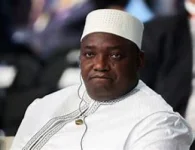Critics question President Barrow's silence following former dictator Jammeh's recent outburst. The administration's lack of response marks a sharp contrast to its swift reactions against other political opponents.
Yahya Jammeh launched verbal attacks against President Barrow 48 hours ago, calling his administration corrupt and incompetent. Jammeh even declared he would return to The Gambia without consequences. The government has remained notably quiet.
This stands in stark contrast to the administration's typical response pattern. When opposition leaders like Ousainou Darboe or Essa Faal raise concerns, President Barrow and his officials react immediately. Government representatives, including Deputy Speaker Seedy Njie and Information Minister Ismaila Ceesay, often launch strong counterattacks against critics.
The administration's handlers frequently target political figures, journalists, and activists with harsh rhetoric. Yet these same officials remain silent in the face of direct threats from Jammeh, who faces accusations of human rights violations during his previous rule.
Jammeh maintains significant influence in Gambian politics. Four National Assembly Members represent his interests, and several cabinet members previously supported his regime. President Barrow's earlier alliance with Jammeh's APRC party further complicates the relationship.
The government's silence raises questions about its commitment to transitional justice. Justice Minister Dawda Jallow has not addressed Jammeh's statements or reassured victims, and no official has mentioned plans for Jammeh's extradition.
Civil society organizations and victims' groups demand answers. They question whether the administration places a higher priority on challenging domestic critics than addressing threats from the former dictator.
The situation highlights ongoing tensions in The Gambia's political landscape. Citizens await an official response from the government regarding Jammeh's statements and its plans for accountability.
Yahya Jammeh launched verbal attacks against President Barrow 48 hours ago, calling his administration corrupt and incompetent. Jammeh even declared he would return to The Gambia without consequences. The government has remained notably quiet.
This stands in stark contrast to the administration's typical response pattern. When opposition leaders like Ousainou Darboe or Essa Faal raise concerns, President Barrow and his officials react immediately. Government representatives, including Deputy Speaker Seedy Njie and Information Minister Ismaila Ceesay, often launch strong counterattacks against critics.
The administration's handlers frequently target political figures, journalists, and activists with harsh rhetoric. Yet these same officials remain silent in the face of direct threats from Jammeh, who faces accusations of human rights violations during his previous rule.
Jammeh maintains significant influence in Gambian politics. Four National Assembly Members represent his interests, and several cabinet members previously supported his regime. President Barrow's earlier alliance with Jammeh's APRC party further complicates the relationship.
The government's silence raises questions about its commitment to transitional justice. Justice Minister Dawda Jallow has not addressed Jammeh's statements or reassured victims, and no official has mentioned plans for Jammeh's extradition.
Civil society organizations and victims' groups demand answers. They question whether the administration places a higher priority on challenging domestic critics than addressing threats from the former dictator.
The situation highlights ongoing tensions in The Gambia's political landscape. Citizens await an official response from the government regarding Jammeh's statements and its plans for accountability.












